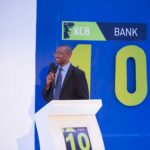Kenya Commercial Bank (KCB) Group rode on a strong loan and deposit growth and improved operating efficiencies to post UGX. 1.01tn in Pre-Tax profit for the full year ending December 31, 2016.
Earnings before tax rose 10% from UGX 923.7 billion posted the same period last year, KCB Group CEO and MD, Joshua Oigara, said, attributing the headway to the Bank’s continued and deliberate focus on growth, efficiency, and value creation for shareholders.
“Our strategic focus to consistently deliver on excellent customer experience, drive credit growth and secure new business opportunities has helped guarantee positive performance. We are committed to bolstering this model to build a sustainable business for the future,” said Mr Oigara.
He further noted that the Bank is on a strong technology foundation that should drive the business stronger into the future.
“We are rolling out an elaborate fintech proposition this year that will significantly transform the way we interact with our customers. This will also enhance our capacity to innovate rapidly and quickly in our current environment,” said Mr Oigara.
He added: “It is our view that fintech is the future of the Bank and we are therefore re-engineering our set up to bring in more simplicity and efficiency while expanding our channel. The acceleration of technology today allows us to imagine unprecedented growth of our business”.
KCB Group Chairman Ngeny Biwott said the bank was resilient despite the hard economic times in the East African region.
“We saw sustained business resilience in a relatively tough macro-economic environment across the East African region. Markets like South Sudan, Burundi and Uganda experienced business shocks, as was the case with Kenya where an interest capping regime redefined the operating environment,” Mr. Biwott said.
In February, Bank of Uganda (BoU) reduced the Central Bank Rate (CBR) by 0.5 percentage points to 11.5 per cent, saying the move is meant to stimulate economic activities in the country which have persistently remained low. The Central Bank also reduced Uganda’s economic growth rate to 4.5 per cent for this financial year ending June 30, 2017.
Latest data from the BoU’s State of the Economy Report released last December indicated that ‘the domestic economic growth outlook remains subdued’.
“We have in place a responsive operating model which came into play through the difficult times in the year. We are optimistic of an improved macro-economic environment in 2017, even as Kenya and Rwanda go through elections later in the year,” Mr. Biwott said.
In August last year, the Bank upgraded its core banking system, an investment that is expected to guarantee reliability and speed, effectively providing excellence in customer experience.
Meanwhile, the contribution of the international business dropped to less than 5% as a result of the devaluation of the South Sudan Pound and accounting for the Hyperinflationary environment in the country resulting in an overall negative impact on net monetary position.








